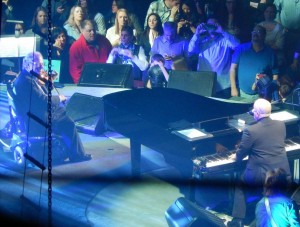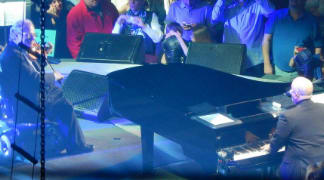 Somewhat tongue-in-cheek, I have referred to seeing Billy Joel in concert at Madison Square Garden as a spiritual experience. His performance this week was no exception. How else can you explain what it feels like to belt out your favorite song with 20,000 strangers who feel the same way?
Somewhat tongue-in-cheek, I have referred to seeing Billy Joel in concert at Madison Square Garden as a spiritual experience. His performance this week was no exception. How else can you explain what it feels like to belt out your favorite song with 20,000 strangers who feel the same way?
A lover of many genres of music, Billy Joel fits perfectly into my musical repertoire. While my iTunes library includes numerous Jewish performers, classical music, show tunes and Israeli artists, the first song I probably downloaded was Billy Joel’s “Piano Man.” After all, I was raised on Long Island and grew up in the 80s: It’s practically my birthright.
An amazing thing happens when Billy Joel sits down to the piano in a packed Garden: New Yorkers begin to melt. While we as a people (New Yorkers, I mean) are generally cynical, hard to impress and proudly tough, that all fades away as he plays a few chords and we rise to our feet. And as he plays “Piano Man” and in one voice we sing, “…and the manager gives me a smile; ‘cuz he knows that it’s me they’ve been coming to see to forget about life for a while,” we secretly know it’s the truth.
I’ve been fortunate to see Joel in concert multiple times, and each time is incredible, but last night was different. I had brought my two eldest children with me, having turned the evening into a teachable moment about humility, dedication to one’s craft and an overwhelming sense of generosity – all of which I believe Joel exemplifies.
It was Joel’s guest, however, that stunned the crowd and changed the night for everyone: When you announce that world renowned violinist Itzhak Perlman is going to join you on stage for a couple of songs, there’s nothing your audience can do except stop, and stare.
A hush fell over this crowd of New Yorkers enjoying the first mild weather day in months as Itzhak Perlman took the stage. We were amazed as Joel announced Perlman would be accompanying him on two selections. The first, “Downeaster ‘Alexa’,” a ballad about the plight of Long Island’s fishermen, is incomplete without a fiddle. Playing that song without a fiddle is like eating an Oreo without a glass of cold milk, and both Joel and Perlman played it with the soul and emotion it deserved, bringing us to our feet. It was the second song, however, that brought me to tears.
“And So it Goes,” a song filled with raw emotion and pain about the ending of a relationship, was played perfectly by these two artists with no additional musical accompaniment. Just the sounds of a piano and a violin filled this hallowed musical cathedral. Looking around the arena, it was at that moment that it hit me: there was a Jewish man, born in Tel Aviv, who happens to also be in a wheelchair, center stage with Billy Joel, at Madison Square Garden, and he had us all in awe. And so I cried.
Though they had not come together, I noticed the gentleman at the end of our row turn to the people sitting behind him. We were all part of this moment and so talking to a complete stranger was actually totally normal. Still mid-ovation, the man looked at them and said, “THAT was a once in a lifetime moment.” Even he was overwhelmed and while it might have been for a different reason, his feelings only added to mine.
Just months after the kidnapping and brutal murder of three innocent teens and then a war, while Israel and its leaders continue to dominate the news, when our children on college campuses face continued anti-Israel rhetoric, and as our brethren in Europe face continued anti-Semitism, seeing Perlman receive a uproarious standing ovation by this massive crowd at the end of his performance meant more to me than it might have to others. Having my children there to witness this moment compounded the emotions I was already feeling. And seeing the expression of appreciation of gratitude and humility on Perlman’s face could not have made me any prouder to be a Jew.
Maybe referring to this concert as a spiritual experience isn’t such a stretch after all…
The words of this author reflect his/her own opinions and do not necessarily represent the official position of the Orthodox Union.
